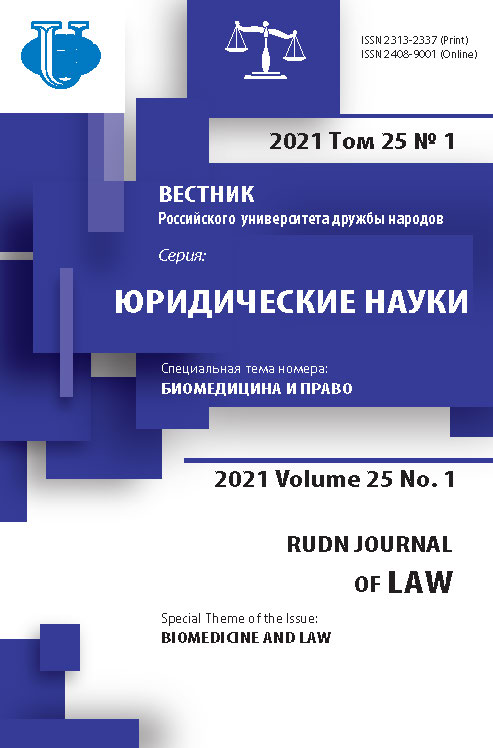Legal aspects of using genetic evidence on the example of US judicial practice
- Authors: Ponomareva D.V.1,2, Sorokina E.M.2,3
-
Affiliations:
- Kutafin Moscow State Law University (MSAL)
- Scientific Collaboration "Legal Genomics Developments Alliance (LeGenDA)"
- Attorneys at law «Reznik. Gagarin & Partners»
- Issue: Vol 25, No 1 (2021): BIOMEDICINE AND LAW
- Pages: 87-106
- Section: GENETICS AND LAW
- URL: https://journals.rudn.ru/law/article/view/26037
- DOI: https://doi.org/10.22363/2313-2337-2021-25-1-87-106
- ID: 26037
Cite item
Full Text
Abstract
Advances in genomic research, biobanking and DNA identification technologies are expanding the use of biological and genetic evidence in litigation. The discovery of DNA and one of its functions to transmit hereditary information made it possible to look differently at the theory of a genetic predisposition to deviant behavior. The relevance of the study is due to the fact that the availability and increase of genetic research allows, along with the traditional use of genetic expertise in litigation (search and identification of a criminal, establishment of paternity), to expand the possibility of using the achievements of genetics by the parties to prove other circumstances in court. In this article, the authors analyze the US jurisprudence regarding the possibility of a party using the protection of genetic evidence in order to present a position in justification of the mitigation of punishment for an accused due to her genetic predisposition to criminal behavior. The authors also paid attention to the consideration of the issue of using the results of genetic testing in civil proceedings in order to prove the fact of the influence of the inherited gene on deviant behavior. In carrying out this study, the authors used a significant number of Russian and foreign sources of scientific literature. General and specific scientific methods of cognition, including the formal legal and comparative legal method, were used as research methods
Keywords
About the authors
Daria V. Ponomareva
Kutafin Moscow State Law University (MSAL); Scientific Collaboration "Legal Genomics Developments Alliance (LeGenDA)"
Author for correspondence.
Email: ponomard@yandex.ru
Candidate of Legal Sciences, Deputy Head of the Department of Practical Jurisprudence
9 Sadovaya - Kudrinskaya str., Moscow, 123995, Russian FederationElizaveta M. Sorokina
Scientific Collaboration "Legal Genomics Developments Alliance (LeGenDA)"; Attorneys at law «Reznik. Gagarin & Partners»
Email: sorokina-liza@yandex.ru
Candidate of Legal Sciences, Lawyer
3 Shmitovsky passage, Moscow, 123100, Russian FederationReferences
- Aleksandrov, A.A. (2008) Psychogenetics: text book. Saint Petersburg, Piter Publ. (in Russian)
- Appelbaum, P.S. & Scurich, N. (2014) Impact of Behavioral Genetic Evidence on the Adjudication of Criminal Behavior. Journal of the American Academy of Psychiatry and the Law. 42(1). 91-100. Available from: http://jaapl.org/content/42/1/91 [Accessed 2nd December 2020]
- Argunova, Yu.N., et al. (2001) Criminology. Textbook for universities. (in Russian)
- Burtsev, A.K. & Vasiliev, S.A. (2019) Issues of establishing legal liability for offenses related to the diagnosis and human genome editing. Relevant Problems of Russian Law. (8). 62-67. (in Russian)
- Coffey, M.P. (1993) The Genetic Defense: Excuse or Explanation? William and Mary Law Review. 35(1), 353-399. Available from: https://scholarship.law.wm.edu/cgi/viewcontent. cgi?article=1784&context=wmlr [Accessed 3rd December 2020]
- Denno, D.W. (2013) What Real-World Criminal Cases Tell Us About Genetics Evidence. Hastings Law Journal. (64), 1591. Available from: https://ir.lawnet.fordham.edu/faculty_ scholarship/505 [Accessed 2nd December 2020]
- Friedland, S.I. (1997) The Criminal Law Implications of the Human Genome Project: Reimagining a Genetically Oriented Criminal Justice System. Kentucky Law Journal (Lexington, Ky.). 86 (2), 303-366
- Kalinichenko, P.A. (2019) Development of court practice in cases involving human genomics: world experience and Russia. Lex Russica. 6 (151), 30-36. (in Russian)
- Kosilkin, S.V. (2020) Experience of Legal Regulation of Biobank Activities in Foreign Practice and the development of Russian Legislation. Courier of Kutafin Moscow State Law University (MSAL). 4(68). 79-87. (in Russian)
- Kubitovich, S.N. (2017) DNA as an information carrier unlimited number of individuals. Bulletin of economic security. (4). 185-190. (in Russian)
- Lynch, M., Cole, S.A., Mcnally, R. & Jordan, K. (2008) The Contentious History of DNA Fingerprinting. Chicago, University of Chicago Press
- Machado, H. & Granja, R. (2020) Forensic Genetics and Governance of Transnational Criminality. In: Forensic Genetics in the Governance of Crime. Singapore, Palgrave Pivot. pp. 71-84. Doi.org/10.1007/978-981-15-2429-5_6
- Mnookin, R.H. & Weisberg, D.K. (2014) Child Family and State: Problems and Material on Children and the Law. Wolters Kluwer law & Businesse in New York
- Morse, S.J. (1982) Failed Explanations and Criminal Responsibility: Experts and the Unconscious. Faculty Scholarship at Penn Law. Available from: https://scholarship. law.upenn.edu/faculty_scholarship/1351 [Accessed 5th December 2020]
- Osnitsky, A.V. (2008) Theoretical and methodological foundations of mental heredity Psychological traits of a person. Vestnik of Saint Petersburg University. Series 12. Psychology. Sociology. Pedagogy. (1). 187-199. (in Russian)
- Ponomareva, D.V. (2019) Patenting of human genes: judicial practice of the USA, Canada and Australia. Relevant Problems of Russian Law. (9). 166-173. (in Russian)
- Ross, J.L., Zeger, M.P., Kushner, H., Zinn, A.R. & Roeltgen, D.P. (2009) An extra X or Y chromosome: contrasting the cognitive and motor phenotypes in childhood in boys with 47, XYY syndrome or 47, XXY Klinefelter syndrome. Developmental disabilities research reviews. 15(4), 309-317. Doi.org/10.1002/ddrr.85
- Scurich, N. & Appelbaum, P.S. (2017) Behavioral Genetics in Criminal Court. Nature human behavior. (1), 772-774. Doi.org/10.1038/s41562-017-0212-4
- Secretareva, T.M. (2011) "Medical concept" of understanding the causality of behaviuor breaking social norms. Medical Law. (4). 24-28. (in Russian)
- Shestak, V.A. & Ulyanova, E.K. (2020) Judicial process in power of genetical evidence. Myth or Reality: USA Experience. Education and law. (5). 198-203. (in Russian)
- Wasserman, D. & Wachbroit, R. (eds.) (2001) Genetics and Criminal Behavior (Cambridge Studies in Philosophy and Public Policy). Cambridge, Cambridge University Press
Supplementary files















